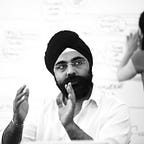The Dark matter of Open Making…..
Open manufacturing faces a dark matter challenge. It sits at the cusp of multiple futures; much like the sharing economy faced a few years ago, it presents a critical fork in its future.
This moment will, in many ways decide whether we will build this 21st century infrastructure for radically democratised production & innovation on the decaying remnants of 19th century institutional infrastructure or on a fairer, more democratic architecture.
Will we leverage new capabilities to advance new monopolies of capital or imagine a new class of institutional infrastructure which leverages its DNA of democratic making and builds an inclusive economic settlement for our age.
The challenge we face in the maker movement is increasingly not the need to grow experimental lab infrastructure. There is a growing network of makers labs, fab labs and tech shops. And neither is it a fundamentally a challenge of products or even makers I would argue — but instead one of reforming the old institutional structures and logics to which we are systemically accustomed to.
The challenge we face is fundamental to the roots of the industrial producer-consumer transaction economy. It addresses the roles and protocols of our consumer system. When everyone can be a designer and producer, who is the consumer? In this blurring future, what do consumer rights look like in a fused and knotted pro-consumer economy. How do we reimagine rights and responsibilities when working across decentralised open supply chains?
The challenge is how can we new technologies like Blockchain to decentralise innovation & assembly, making it realtime, agile & contextual; shifting it from supply chain logics to supply fabrics
The challenge – how can we support massive collaboration amongst multiple actors spanning the architect, designer and producer to name but a few; accelerating open collaboration and production — a social Moores Law — whilst creating legal accountability? How can we use Blockchain to re-invent agile open distributed meshworks of insurance & thereby distributed innovation?
The challenge is also, how can we create the product documentation architecture to match this decentralisation and massive continuous collaboration — can we build an instruction architecture for rapidly compiling at the point of “consumption”?
How do we create smart multi-actor contracting to accurately attribute this new economy in real-time? How do we create design practices and design discrete product APIs to allow for massive multi-actor innovation across realtime, and continuously across multiple product-part designers and optimisers?
These are just some of the dark matter challenges we face in the process of building an open making economy which can deliver the new economic settlement it promises. Addressing these challenges will be critical if we are to realise the great promise offered — a new hyper-local and globally connected economy — a systems economy transcending the corporate economy.
To ensure we build this open economy we need to make an open call for all those who want to be involved, to get involved. For this future it is no longer enough to imagine maker clusters full of hippy designers and cool makers. We need to invite the accountants, lawyers, data scientists, academics, investors and many more — as the only way a true Open Making economy will be given birth to is to really reinvent our 19th century institutional architecture, without which we risk falling into the same traps facing the sharing economy.
This is increasingly our challenge in unleashing the #openmaking economy.
Indy Johar & Andy Reeve
Originally Published on https://openmaking.is/field-guide/the-dark-matter-of-open-making
